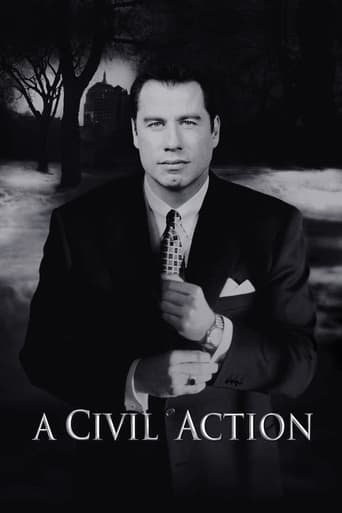LeonLouisRicci
Courtroom Dramas Have Been a Regular Part of the Hollywood System Ever Since Movies Learned to Talk. The Value of Entertainment is as Varied as the Number is Large.Speaking of Numbers, In This One, Numbers Play an Integral Part. There is Much Verbiage and Exposition of the "Value" Placed on Numbers. That Being the Charts that Insurance Companies and Lawyers Rely on to Put a "Value" of Any Said Coverage or Litigation. That is to be Expected Because it is Something that the Average Joe has Probably Heard of but Need Details to "Flesh" Out.For Example, the "Value" in Dollar Terms is Given to What is and What is Not Considered Valuable for Insurance Companies to "Risk" Any Given Client or Customer. Blacks are Considered Less Valuable Than Whites and Children are Considered Less Valuable Than Adults (in dollars of course).John Travolta is Well Cast as a Cocky "Ambulance Chaser" that Acquires an "Epiphany" by Osmosis as He Takes On and is Than Consumed by the Tragedy and Lack of Compassion by Big Corp. as its Lawless Practices are Revealed to Be What They Are. Greed, Unsympathetic to All But the Bottom Line, Irresponsible and Intolerable to All But Those Receiving Compensation for Their Work.Robert Duvall Got an Oscar for His Charming, but Ultimately Villainous Role as the Major Litigator for the Defense of an Almost Billion Dollar Corporation. He Knows His Lawyer Stuff and Accepts His Place in the Evil Doings by Escaping to Boston Red Sox Worship and Having an Hour a Day (Lunch Hour) to Purge Guilt and Play "Regular Guy".The Film is Straightforward with No Claptrap Exploited with Claptrap and is Respectful of the Grief and Suffering. It Has a Polished Look with a Gaggle of Polished Actors. The True Story is a Tearjerker and a No Brainer About How Big Money Purchases the Souls of Otherwise Decent Folks (to feed their families) and is a Much Told Scenario that Generally Goes Unheard by the Masses. Thank God for the EPA (taking on noble causes and doing what little folks are powerless to do against such giants in most cases), but Like Most Government Agencies a Bit Slow on the Uptake.
namashi_1
Based on the book of the same name by Jonathan Harr, 'A Civil Action', directed neatly by Steven Zaillian, is A Gripping Film, that brings a true-story on celluloid, efficiently. The Writing, at most places, is sharp, and the performances by Travolta and Duvall, are hugely effective.'A Civil Action' is based on a true story of a court case about environmental pollution that took place in Woburn, Massachusetts in the 1970s. It was a tragic time, for the people who lost their loved ones. And the cinematic version pays respect to them. The Court Scenes are sharply written and executed, while some scenes, especially towards the end, lose pace.Steven Zaillian's Adpated Screenplay is mostly intense and gripping. His direction, is neat as well. Cinematography by Conrad L. Hall is picture perfect. Editing is fair.Performance-Wise: Travolta and Duvall, both own the film. Travolta is flawless as the righteous attorney, while Duvall is powerful and menacing. Among other performances, William H. Macy and James Gandolfini stand on their own with note-worthy performances. John Lithgow is perfect, as ever.On the whole, A Must See Film!
jDriftyx82
The case in Woburn, Massachusetts began with one woman's suspicions. Anne Anderson discovered her son, Jimmy, had leukemia in the summer of 1966. During the time Jimmy was being treated for leukemia, Anne began to talk to people in her neighborhood. She soon heard of two other cases of childhood leukemia only a street away from her. Anne began talking with one of the mothers, Joan Zona, because her son had leukemia as well and the two women became friends. They discussed the incidences of leukemia in their neighborhood and both agreed that it was a strange coincidence, but Anne became obsessed with the idea. She discovered several other cases of leukemia and began to analyze why this was happening. Anne started worrying about the water in Woburn, which had not tasted good since two wells, called G and H, were drilled and began pumping water into eastern Woburn in 1965. Complaints began pouring in to the city of Woburn regarding the quality of the water and the rusting of pipes, thus causing wells G and H to be shut down several times. However, the wells were not shut down for good until much later. Anne expressed her worries to her family doctor, her church minister, and her husband. Anne's husband and doctor listened to her suspicions, but did not believe they had any validity.Now, after reading the book, it became apparent to me that, the book was much more interesting and intriguing.
sddavis63
If you go into this expecting an exciting, edge of your seat legal thriller type of movie you;re going to be disappointed. I watched this twice. The first time because from what had been described, that's what I was expecting - and I was disappointed. But I decided to give it another chance, reflecting more on the moral of the story and the characters. Using this lens, I wasn't disappointed.John Travolta put on a pretty good performance as Jan Schlictmann, a personal injury lawyer who, although unenthused at first, takes on a case involving environmental contamination that has caused several children in Massachussetts to die of leukemia. Basically, he takes it on because he discovers that there are two huge corporations he could get money from, and that's one moral of the story: personal injury law is less about the victims who've been hurt and more about the money that can be made. IN fact, the very opening of the movie establishes that well, as Schlictmann (in a narration by Travolta) describes who the preferred victims are, based on how much money you can expect to make off them, and children are at the bottom of the list. Schlictmann belongs to a small but pretty successful law firm that doesn't accept cases unless they know they can win, since that's the only way they get paid. The whole point of this type of practice, we're told, is to avoid trials and get big settlements. His colleagues doubt the wisdom of accepting this case but go along with it, until Schlictmann loses his "perspective" in two way: he actually starts to care about the victims, declining large settlements because they're not enough, and, faced with a degree of contempt from the big law firms he's going up against, he decides he has to prove himself. The result is disaster. The firm and all the partners go broke, even after a settlement is made, because what they get doesn't come close to covering their costs, and the families are disappointed because they didn't really care about money - they wanted an apology and a clean-up.Although not especially exciting, the movie is well-paced and interesting, and includes a solid supporting cast, including folks like Robert Duvall, William H. Macy and Tony Shalhoub. I found the end a bit anti-climactic. Hard to believe you could feel sympathy for an ambulance chaser, but by the time the movie ends, I really wanted Schlictmann to win. Instead, he ends up totally destitute - telling a bankruptcy judge that he's left with $14 and a portable radio. He wants to continue the case but doesn't have the resources, so he turns everything over to the EPA. They do take the case on - and win - but Schlictmann is long gone by the time that happens.Since this was a true story, it was nice to see the companies forced to pay up, and somewhat uplifting to learn that Schlictmann switched from personal injury law to environmental law. And, as much as I wanted him to succeed in this case in the end, it is a true story, so the end was what it was. A pretty good movie all in all. 7/10






